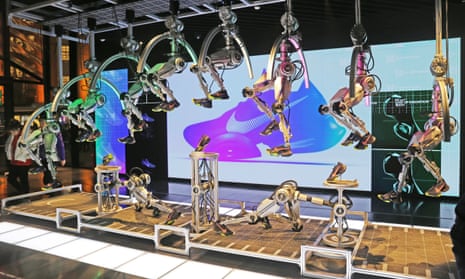Anger with Nike has erupted on Chinese social media after the company issued a statement saying it was “concerned about reports of forced labour” in China’s Xinjiang province, and that it would not source textiles from the region.
The backlash over the Nike statement was among the highest trending topics on China’s Twitter-like social media Weibo on Thursday.
The popular Chinese actor Wang Yibo, 23, terminated his contract as a representative for Nike in response to the statement, his agency said on Weibo on Thursday.
Chinese top idol Wang Yibo Thursday terminated contracts with @Nike.
— CGTN (@CGTNOfficial) March 25, 2021
"I firmly oppose any act to smear China," he said in a statement, following the brand's remarks over forced labor in the #Xinjiang Uygur Autonomous Region. pic.twitter.com/wRpAUYnLWa
Wang, who has found international recognition through the period drama The Untamed, and who has 38 million followers on Weibo, said he opposed “any act to smear China”, according to China Global Television Network (CGTN) on Twitter.
Another Chinese actor, Tan Songyun, followed by 23 million on Weibo, also announced she was terminating her contract with Nike.
It was unclear when Nike had put out the statement, which did not have a date on it. Nike did not immediately respond to a request for comment.
“We are concerned about reports of forced labor in, and connected to, the Xinjiang Uighur Autonomous Region (XUAR),” the statement said.
“Nike does not source products from the XUAR and we have confirmed with our contract suppliers that they are not using textiles or spun yarn from the region.”
The move comes amid anger in China at the Swedish clothing giant H&M’s decision to no longer source cotton from Xinjiang .
The fashion retailer’s products vanished from Chinese tech titan Alibaba’s e-commerce platform Taobao on Wednesday, while two popular actors cut ties with H&M and state media published commentaries criticising the company.
Last year H&M said it would not source cotton from Xinjiang and was ending its relationship with a Chinese yarn producer over “forced labour” accusations involving minorities in the region.
The company’s statement came after a report by thinktank the Australian Strategic Policy Institute pointed to H&M as a beneficiary of a forced labour transfer programme.
H&M China in a statement on Wednesday night said it “does not represent any political position” and remains committed to long-term investment in China.
The Communist Youth League and China Central Television [CCTV] criticised H&M for “spreading rumours”, leading to boycotts of cotton-sourced products.
Besides H&M and Nike, state-run Beijing Youth Daily name-checked Adidas, New Balance, and Burberry for being members of the Better Cotton Initiative which suspended licensing of cotton sourced from Xinjiang early in 2020 due to lack of access and due diligence on whether supply chains there were using forced labour.
Around a dozen Japanese companies, including clothing brands Uniqlo and MUJI, are also believed to have suspended transactions related to Xinjiang cotton.
The row follows the introduction of sanctions against Chinese officials announced on Monday by the European Union, United States, Britain and Canada over alleged human rights abuses in Xinjiang.
China retaliated with sanctions on European lawmakers and institutions.
Human rights groups have described mass human rights abuses in Xinjiang, including the incarceration of more than a million people in internment and re-education camps, forced labour, mass sterilisation of women, and restrictions on religion, culture and language, as cultural genocide.
China has denied these claims and says it is providing vocational training, and that its measures are needed to fight extremism.
Hu Xijin, outspoken editor-in-chief of the state-run Global Times, urged western companies on Wednesday to be “highly cautious” and not to “suppress China’s Xinjiang” in a social media post.
To do so would “undoubtedly arouse the anger of the Chinese public,” he added. He did not single out any companies.
Reuters and AFP contributed to this report.
